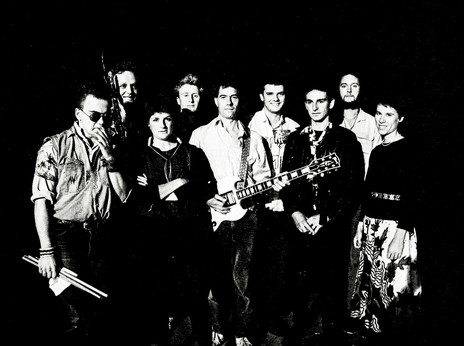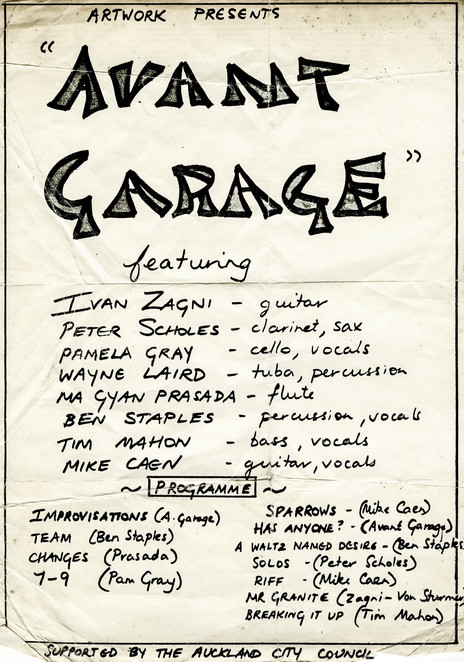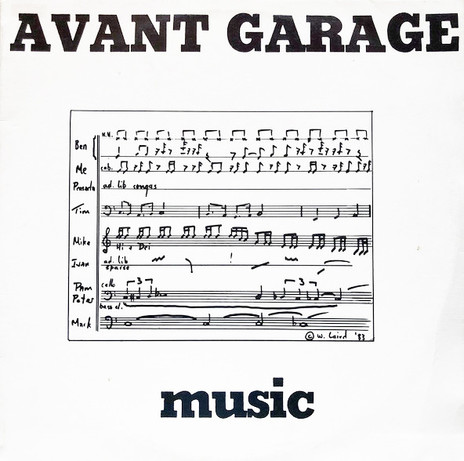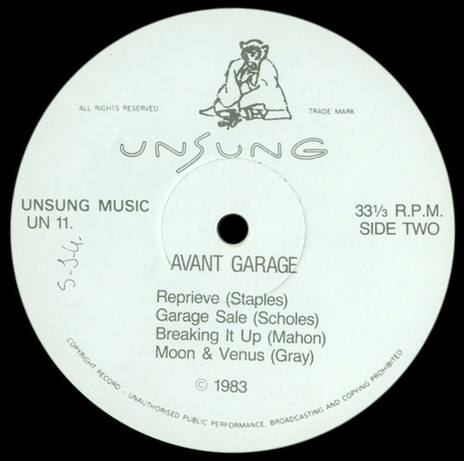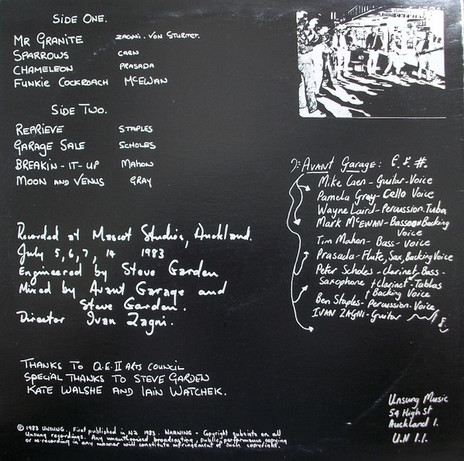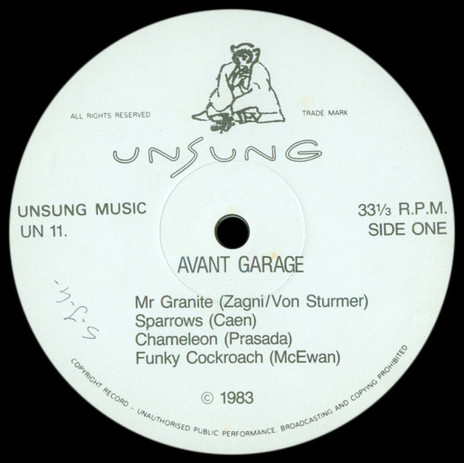Scholes, Laird and Prasada all came from the Auckland Regional Orchestra. Staples had been in The Newmatics and Miltown Stowaways (along with ex-Newmatics Syd Pasley and Kelly Rogers, who were in Big Sideways), Mahon was in Blam Blam Blam and part of Export Lamb, and Caen had been in Street Talk and Blind Date.
The group spent three months writing and rehearsing before embarking on a string of gigs in art galleries, theatres, and schools.
Zagni told Rip It Up’s Russell Brown (September 1983) one of the most interesting aspects of the PEP groups was the music workshops in schools. “You see how starved the young kids are of music. They’ve really missed out.”
After each school performance, the group would teach sections of a song to some keen young music students, and then get them to perform along with them.
The NZ Listener’s Bruce Gooding attended a performance and workshop the group did at Glenfield College and wrote: “Forty pupils – string and wind players, flautists and guitarists, percussionists, you name it – are handling Avant Garage’s brand of 4/4 time like veterans as they play along with the band. Two hours earlier, you could have excused these young players for thinking Avant Garage was a car repair firm, not an eight-piece band, as they shuffled into the school music room.
“The kids sat spellbound, though a trifle dazed, as one of Auckland’s most exhilarating groups … launched into its repertoire.”
“Yet the kids sat spellbound, though a trifle dazed, as one of Auckland’s most exhilarating groups … launched into its repertoire. After the concert comes the workshop … For a scant 20 minutes the youngsters were introduced to a few bars from Mahon’s composition ‘Breaking It Up’. For a while, glorious anarchy reigned, everybody practising out of tune. Then the big moment. Mahon yells a one, two, three, four, and the impromptu big band leaps into action. The number had sounded so complex when the band had performed it alone, but the kids are right with it. There’s envy on the faces of their schoolmates watching from the door.”
As their six months together ended, Avant Garage headed into Mascot Studios in July 1983 for three days to put down their album, with Steve Garden engineering. Released later in the year on Unsung Music, the album was simply called Music.
Reviewing it in October’s Rip It Up, David Taylor noted, “Avant Garage is more adventurous than the pioneering Big Sideways, as its music is not directed at a rock audience. It’s a brave experiment … That diversity shows in the music which cannot easily be categorised. It’s not classical, jazz or rock, although it owes much to all.
“This potpourri of form varies from track to track as each of the eight songs on Avant Garage’s Music was composed by a different band member. That said, the album still flows fairly well as flute and bass provide continuity. The songs showcase the musicians’ undisputed talents, but are, as a result, occasionally a trifle indulgent.
“The pity is that this album is unlikely to receive the recognition it deserves. By virtue of association with the rock scene, few classical or jazz buffs will become aware of it. Equally, popular music fans will find much of the album (with the exception of Tim Mahon’s “Break It Up’) hard to take because of its affinity with other music forms.
“Avant Garage Music is an audacious and adventurous record quite unlike anything else local musicians have recorded.”
Ira Robbins of US magazine Trouser Press also reviewed the album, saying “... New Zealand’s determinedly oddball Avant Garage sounds like something Zappa might have done in his dada orchestral phase … it’s the lyrics and vocals on songs like ‘Garage Sale’ and ‘Mr Granite’ that give this its modern, boundary-breaking character. Intelligent, esoteric, and fascinating.”
The group had gone its separate ways by the time the album came out. Unlike Big Sideways, who had some impetus to continue, this collective was perhaps too diverse in interests, with classical members pursuing very different careers from the rock musicians involved.
Staples had the debut album from his outfit Miltown Stowaways arrive around the same time, also on Unsung Music. The label also released a live cassette by Avant Garage called Garage to Gallery.
“The highlight of Avant Garage was the characters that came through in the music ” – Ivan Zagni
Zagni told Brown, “The highlight of Avant Garage was the characters that came through in the music. The Big Sideways was more conventional – everyone was trying to be that sound.”
Brown noted that Zagni had decided two PEP schemes were enough for him and he was moving on, and planned to start his own group in October, “when a couple of well-known musicians return from overseas. The new group will give him a chance to perform and develop his own work, something his position as scheme director did not allow.”
Zagni went on to collaborate regularly with Peter Scholes during the 1980s, including releasing a cassette on Unsung with him using the name Four Minute Exposure, a project they toured through art galleries and theatres in October 1983. This tour came about after the guitar/woodwind duo’s TV appearance on Nock On Jazz resulted in a flood of letters from around the country asking when they would be playing in other centres. They also undertook a tour of schools.
He collaborated in 1984 with Steve Garden on the album A Selection of Trouble Spots (Ode Records). Unsung also released a solo cassette by Zagni in 1983, called London 79.
Zagni wrote several orchestral pieces commissioned by the NZSO, Auckland Philharmonia Orchestra, and NZ Chamber Orchestra across the 80s and into the early 90s and held several composer-in-residence slots with some of them. He has also composed music for films, TV, and dance.
More recently, he has worked again with Steve Garden, revisiting their 1984 album and remixing and reworking it for release on one of Garden’s labels, Rattle Echo, in 2020. They followed this up in 2021 with Exiles, drawing on material recorded for a planned follow up to A Selection of Trouble Spots in the mid-80s as a base.
